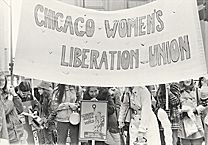| Entries |
| C |
|
Chicago Women's Liberation Union
|

|
The union's programs raised consciousness, challenged power structures through direct action, and provided services for women. Committed to democratic and decentralized structures, union members chose to develop accountable leaders, rather than dismiss altogether the notion of leadership.
Individual chapters were linked through a steering committee, outreach newspapers ( Womankind, Blazing Star, and Secret Storm ), and an internal newsletter. “ Jane ” (or “the Service”) provided first referrals and then clandestine abortions. Later, the Abortion Counseling Service and the Health Evaluation and Referral Service (HERS) advocated quality health care.
The CWLU influenced the development of women's studies programs locally, ran a Liberation School, organized high-school girls, and offered courses at Dwight Correctional Institution. Its rock band recorded Mountain Moving Day in 1972. The Graphics Collective marketed silk-screen posters nationally. The CWLU organized sports teams and challenged sexism in the Chicago Park District.
With the Chicago chapter of the National Organization for Women, the CWLU successfully sued Chicago for sex discrimination onbehalf of city “janitresses. ” Blazing Star, the lesbian chapter, worked for a lesbian and gay rights ordinance. Action Coalition for Decent Childcare (ACDC) won changes in licensing codes for day care providers, and the Legal Clinic offered advice on tenant issues and divorce.
Although most members were European American, the CWLU supported the Black Panthers, worked with the Puerto Rican Socialist Party, and organized against racial discrimination in gay and lesbian bars.
The Encyclopedia of Chicago © 2004 The Newberry Library. All Rights Reserved. Portions are copyrighted by other institutions and individuals. Additional information on copyright and permissions.